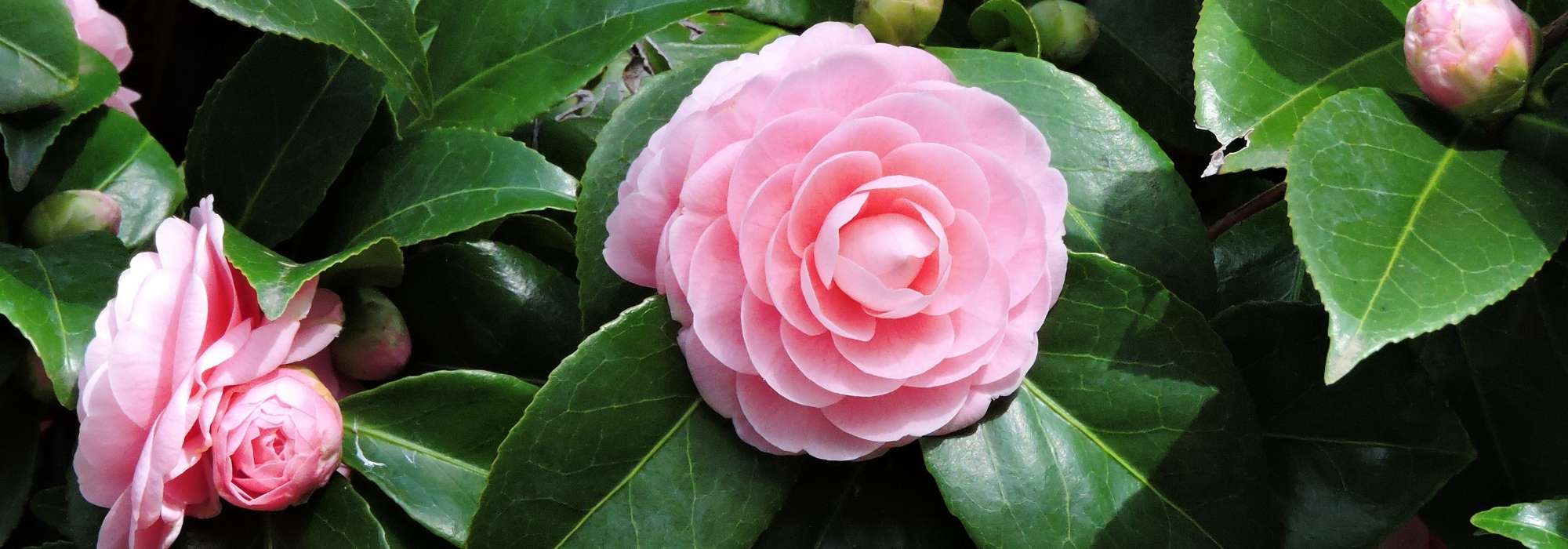
How to choose your camellia? buying guide
to find the variety best suited to your garden
Contents
Camellias are flowering bushes suited to heather soil, highly prized for winter, spring or even autumn flowering. They come in a wide range of forms and colours that delight every gardener. Simply find yours among 200 species and 20,000 different varieties! Here are the essentials to help you choose.
Although your choice depends on aesthetic criteria, ensure hardiness of chosen variety. Indeed, in oceanic climate all camellias are suitable whereas in continental climate you must choose a very hardy camellia or risk all flower buds being destroyed by frost.
Also, choose your camellia according to its flowering period, flower shape and style of your garden.
Choose your camellia by flowering period
Most camellias bloom as winter ends, but some species bloom in early winter or in autumn. Thus there are two main types of camellias: winter-and-spring flowering camellias and autumn-flowering camellias.
Best winter- and spring-flowering camellias: traditional camellias
Traditional camellias are mainly represented by the species Camellia japonica and its hybrids such as Camellia x williamsonii.

Examples: Camellia x williamsonii Spring Daze with a long flowering period from December to April / Camélia japonica Hagoromo has a long flowering season from January to May / Camellia x williamsii Donation flowers from January to April.
Best autumn-flowering camellias: autumn camellias
Autumn-flowering camellias are represented by the species Camellia sasanqua and its hybrids. The variety Camellia sasanqua Sekiyo is one of the first autumn camellias to flower. Its raspberry-pink flowers appear as early as September. The dwarf variety of Camellia Showa no sakae similarly has fuchsia-pink flowers.
Choose your camellia by flower shape
Camellias offer great diversity of colours in range of whites, pinks and reds. There are also yellow and orange camellias. Each colour exists in multitude of shades from the purest pale to the darkest. Besides these multiple shades, camellia flowers come in different forms. Mainly six flower forms occur in camellias: single flowers, semi-double and double flowers, flowers with imbricate petals, rose-shaped flowers, anemone-shaped flowers and peony-shaped flowers. Each form suits style of garden: natural garden, formal garden or Japanese garden. Let’s discover each one.
Most beautiful camellias with single flowers
Camellias with single flowers have flowers made of a single rank of petals and the stamens are clearly visible. In general, there are maximum 8 petals. Classic varieties include Yuletide, Fairy wand, Sunny Side and autumn varieties such as Versicolor.

Camellias ‘Yuletide’, ‘Sunny Side’ and ‘Versicolor’
These camellia varieties are suited to planting in a country hedge or natural garden.
Most beautiful camellias with double and semi-double flowers
Camellias with semi-double and double flowers display blooms with petals arranged on at least two ranks. Stamens are more or less visible depending on variety. These camellias are particularly suited to romantic gardens or English gardens.
The dark red flowers of Camellia Adolphe Audusson are semi-double, as are Camellia Robert Lasson with its red flowers marbled with white.
Double camellia flowers occur in every colour: in pink with Spring Festival or in white with autumn camellia Fuji no Yuki.

Camellias ‘Adolphe Audusson’, ‘Robert Lasson’ and ‘Fuji no Yuki’
Most beautiful camellias with imbricate-petalled flowers
Very geometric and elegant, camellias with imbricate petals are double, highly regular and have petals that overlap across multiple ranks. Stamens are not visible.
Among camellias with imbricate-petalled flowers, notable varieties include Nuccio’s Pearl, Kerguelen and Sweet Olive. These varieties suit classic or romantic gardens.

Camellias ‘Nuccio’s Pearl’, ‘Kerguelen’ and ‘Sweet Olive’
Most beautiful rose-shaped camellias
Rose-shaped camellias reveal double flowers whose petals overlap but in a less geometric and regular way than imbricate-petalled flowers. Moreover, the centre of the flower is rounder, taking almost the form of a rose bud. These varieties fit perfectly in classic or romantic gardens.
Top 3 varieties of rose-shaped camellias are: Camellia Tom Pouce, Camellia Coquetti and Camellia Valtevareda.

Camellias ‘Tom Pouce’, ‘Coquetti’ and ‘Valtevareda’
Most beautiful anemone-shaped camellias
Anemone-shaped camellias bloom as double flowers whose crown of petals surrounds a centre of stamens resembling small petals. These are called petaloid stamens. This flower form evokes anemone. Four indispensable anemone-shaped camellias are Camellia Bob’s Tinsie, Camellia Marshmallow, Camellia Bokuhan and Camellia Lipstick. We recommend anemone-shaped camellias for Japanese gardens.

Camellias ‘Bob’s Tinsie’, ‘Marshmallow’ and ‘Bokuhan’
Most beautiful peony-shaped camellias
Peony-shaped camellias have double or semi-double flowers whose outer petals are regular while the flower centre is made of petaloid stamens and true stamens mixed at random. Petaloid stamens are more or less regular, undulate or almost crumpled and reveal some true stamens. We recommend peony-shaped camellias for classic or Japanese gardens. Varieties include Volunteer, Nobilissima, Botanyuki and Jurys Yellow.

Camellias ‘Volunteer’, ‘Jurys Yellow’ and ‘Frosted Star’
There are also intermediate and less common forms such as fuchsia-shaped flowers like variety Kujaku Tsubaki, tulip-shaped flowers like Tulip Time, magnolia-like flowers with variety Camellia Frosted Star or Camellia Hagoromo.
Choose your camellia by garden style
Some camellias adapt better to one garden style than another. Colour and flower form influence that choice.
Camellias for natural gardens
For natural gardens, we recommend species with irregular, single flowers or a rustic appearance. Mostly, these are botanical species such as Camellia transnokoensis, which bears small, white, single and fragrant flowers. Other varieties with single flowers in soft or graduated colours can also suit these gardens. We find simplicity of cup-shaped flowers in Autumn Camellia Versicolor or the single anemone-form flower of Camellia sasanqua Narumi Gaita.
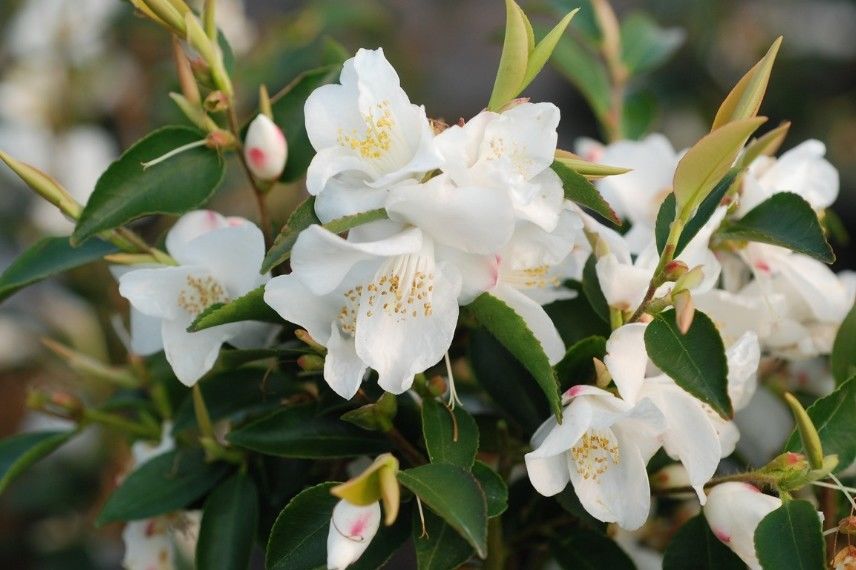
Camellia transnokoensis (©Stervinou)
Camellias for classic gardens: romantic, Italian, English or French gardens
In Italian or French gardens, camellias with rose-shaped flowers or imbricate petals are common, such as Camellia ‘Montironi’. In romantic or English gardens, peony-flowered or rose-flowered camellias are ideal. As for colours, ranges of whites, pinks and reds all work well. Colours can be soft or bold according to preference.
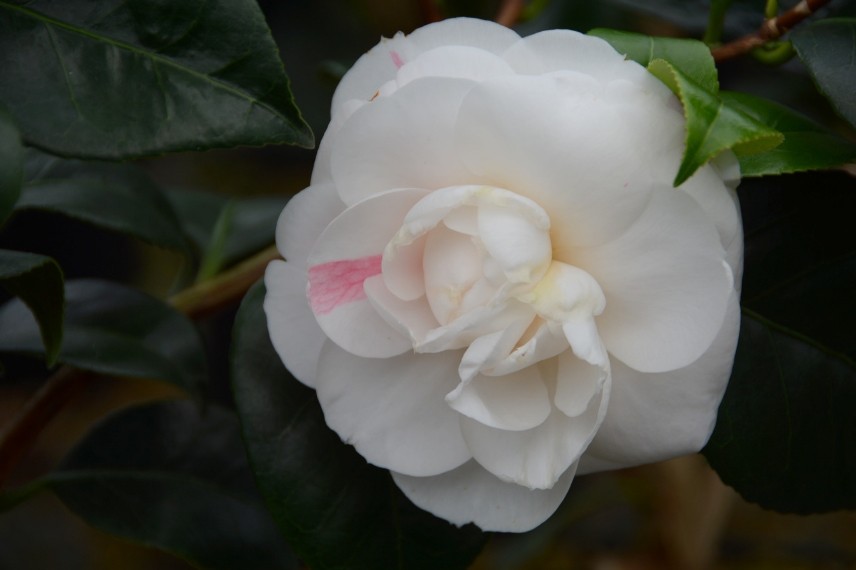
Camellia ‘Montironi’ (©Stervinou)
Camellias for Japanese gardens
In Japanese gardens, camellias easily find a place, since camellia is an emblematic flower of this garden style. However, camellias with anemone-form flowers integrate particularly well into a Japanese garden, such as varieties Bokuhan or Bob’s Tinsie.
Learn more
- Also discover 7 classic white camellias
- Subscribe!
- Contents
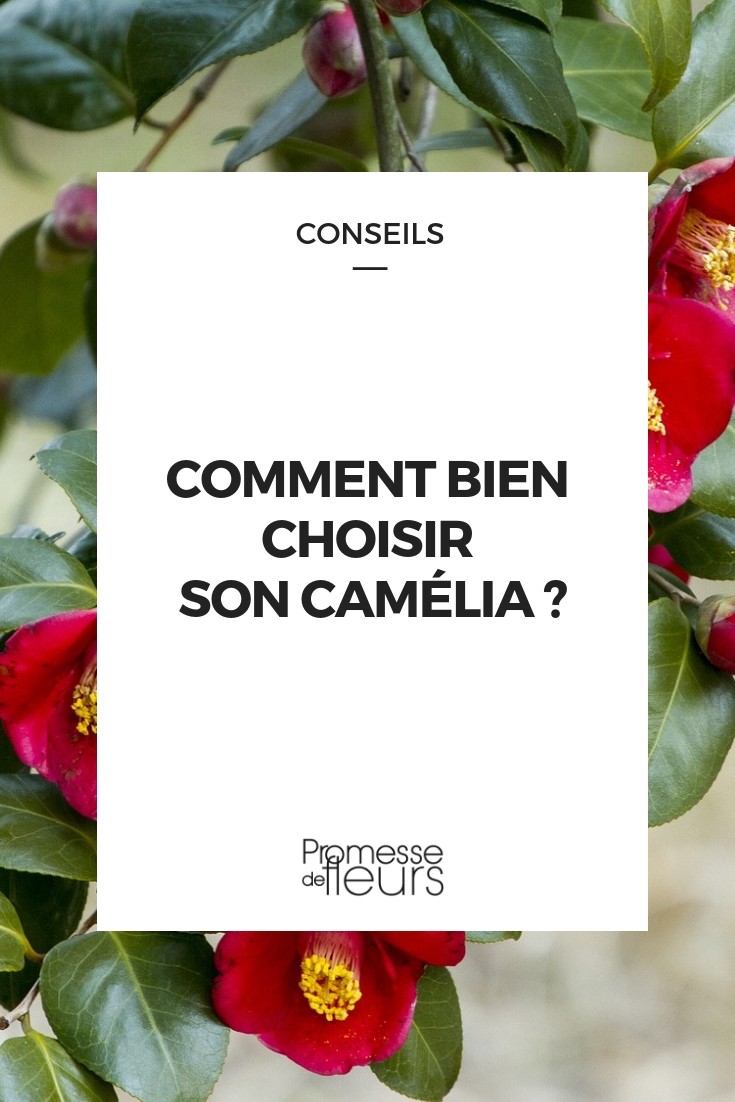






























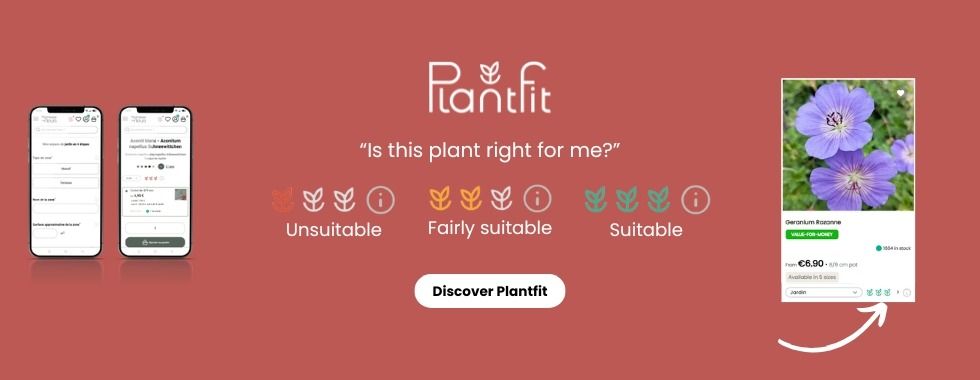

Comments